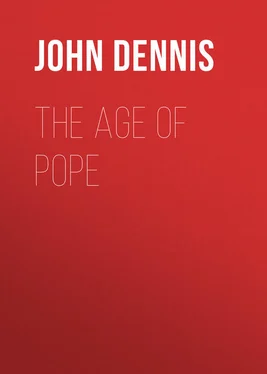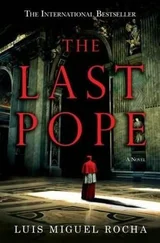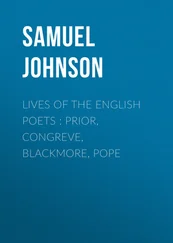John Dennis - The Age of Pope
Здесь есть возможность читать онлайн «John Dennis - The Age of Pope» — ознакомительный отрывок электронной книги совершенно бесплатно, а после прочтения отрывка купить полную версию. В некоторых случаях можно слушать аудио, скачать через торрент в формате fb2 и присутствует краткое содержание. Жанр: foreign_antique, foreign_prose, на английском языке. Описание произведения, (предисловие) а так же отзывы посетителей доступны на портале библиотеки ЛибКат.
- Название:The Age of Pope
- Автор:
- Жанр:
- Год:неизвестен
- ISBN:нет данных
- Рейтинг книги:3 / 5. Голосов: 1
-
Избранное:Добавить в избранное
- Отзывы:
-
Ваша оценка:
- 60
- 1
- 2
- 3
- 4
- 5
The Age of Pope: краткое содержание, описание и аннотация
Предлагаем к чтению аннотацию, описание, краткое содержание или предисловие (зависит от того, что написал сам автор книги «The Age of Pope»). Если вы не нашли необходимую информацию о книге — напишите в комментариях, мы постараемся отыскать её.
The Age of Pope — читать онлайн ознакомительный отрывок
Ниже представлен текст книги, разбитый по страницам. Система сохранения места последней прочитанной страницы, позволяет с удобством читать онлайн бесплатно книгу «The Age of Pope», без необходимости каждый раз заново искать на чём Вы остановились. Поставьте закладку, и сможете в любой момент перейти на страницу, на которой закончили чтение.
Интервал:
Закладка:
That he might have some excuse for his dashing assaults in the Dunciad , Pope had published in the third volume of the Miscellanies , of which he and Swift, Arbuthnot and Gay were the joint authors, an Essay on Bathos in which several writers of the day were sneered at. The assault provoked the counter-attack for which Pope was looking, and he then produced the satire which was already prepared for the press. In its publication the poet, as usual, made use of trickery and deception. At first he issued an imperfect edition with initial letters instead of names, but on seeing his way to act more openly, the poem appeared in a large edition with names and notes.
'In order to lessen the danger of prosecution for libel,' Mr. Courthope writes, 'he prevailed on three peers, with whom he was on the most intimate terms, the good-natured Lord Bathurst, the easy-going Earl of Oxford, and the magnificent Earl of Burlington, to act as his nominal publishers; and it was through them that copies of the enlarged edition were at first distributed, the booksellers not being allowed to sell any in their shops. The King and Queen were each presented with a copy by the hands of Sir R. Walpole. In this manner, as the report quickly spread that the poem was the property of rich and powerful noblemen, there was a natural disinclination on the part of the dunces to take legal proceedings, and the prestige of the Dunciad being thus fairly established, the booksellers were allowed to proceed with the sale in regular course.' 19 19 Life of Pope , p. 216.
The Dunciad owes its merit to the literary felicities with which its pages abound. The theme is a mean one. Pope, from his social eminence at Twickenham, looks with scorn on the authors who write for bread, and with malignity on the authors whom he regarded as his enemies. There is, for the most part, little elevation in his method of treatment, and we can almost fancy that we see a cruel joy in the poet's face as he impales the victims of his wrath. Some portions of the Dunciad are tainted with the imagery which, to quote the strong phrase of Mr. Churton Collins, often makes Swift as offensive as a polecat, 20 20 'Pope and Swift,' says Dr. Johnson, 'had an unnatural delight in ideas physically impure, such as every other tongue utters with unwillingness, and of which every ear shrinks from the mention.'
and there is no part of it which can be read with unmixed pleasure, if we except the noble lines which conclude the satire. Those lines may be almost said to redeem the faults of the poem, and they prove incontestably, if such proof be needed, Pope's claim to a place among the poets.
'In vain, in vain, – the all-composing Hour
Resistless falls; the Muse obeys the Power.
She comes! she comes! the sable Throne behold,
Of Night primæval and of Chaos old!
Before her Fancy's gilded clouds decay,
And all its varying rainbows die away.
Wit shoots in vain its momentary fires,
The meteor drops, and in a flash expires,
As one by one at dread Medea's strain,
The sickening stars fade off the etherial plain;
As Argus' eyes by Hermes' wand opprest,
Closed one by one to everlasting rest;
Thus at her felt approach and secret might,
Art after Art goes out, and all is Night.
See skulking Truth to her old cavern fled,
Mountains of Casuistry heaped o'er her head!
Philosophy that leaned on Heaven before,
Shrinks to her second cause, and is no more;
Physic of Metaphysic begs defence,
And Metaphysic calls for aid on Sense!
See Mystery to Mathematics fly!
In vain! they gaze, turn giddy, rave, and die.
Religion blushing veils her sacred fires,
And unawares Morality expires.
Nor public Flame, nor private, dares to shine;
Nor human spark is left, nor glimpse divine!
Lo! thy dread Empire, Chaos! is restored;
Light dies before thy uncreating word;
Thy hand, great Anarch! lets the curtain fall;
And universal Darkness buries All.'
The publication of the Dunciad showed Pope where his main strength as a poet lay. That the writers he had attacked, in many instances without provocation, should resent the ungrateful notoriety conferred upon them was inevitable. In self-defence, and to add to the provocation already given, he started a paper called the Grub Street Journal , which existed for eight years – Pope, who had no scruple in 'hazarding a lie,' denying all the time that he had any connection with it.
His next work of significance, The Essay on Man , a professedly philosophical poem by an author who knew little of philosophy, was published in four epistles, in 1733-4. Bolingbroke's brilliant, versatile, and shallow intellect had strongly impressed Swift, and had also fascinated Pope. It has been commonly supposed that the Essay owes its existence to his suggestion and guidance. The poet believed in his philosophy, and had the loftiest estimate of his genius. In the last and perhaps finest passage of the poem he calls Bolingbroke the 'master of the poet and the song,' and draws a picture of the ambitious statesman as beautiful as it is false. In Mark Pattison's Introduction to The Essay on Man , 21 21 Clarendon Press, Oxford.
which every student of Pope will read, he objects to the notion that the poet took the scheme of his work from Bolingbroke, observing that both derived their views from a common source.
'Everywhere, in the pulpit, in the coffee-houses, in every pamphlet, argument on the origin of evil, on the goodness of God, and the constitution of the world was rife. Into the prevailing topic of polite conversation Bolingbroke, who returned from exile in 1723, was drawn by the bent of his native genius. Pope followed the example and impulse of his friend's more powerful mind. Thus much there was of special suggestion. But the arguments or topics of the poem are to be traced to books in much vogue at the time; to Shaftesbury's Characteristics (1711), King on the Origin of Evil (1702), and particularly to Leibnitz, Essais de Théodicée (1710).'
In admitting that Pope followed the impulse of a more powerful mind, Mr. Pattison asserts as much perhaps as can be known with certainty as to Bolingbroke's influence, but it is reasonable to believe that the close intercourse of the two men did immensely sway the more impressionable, and, so far as philosophy is concerned, the more ignorant of the two. Mr. Pattison also overlooks the fact that Pope confessed to Warburton that he had never read a line of Leibnitz in his life. That the poet acknowledges his large debt to Bolingbroke, and that Bolingbroke confesses it was due, is all that can be declared with certainty. That which makes the Essay worthy the reading is the fruit, not of the argument but of the poetry, and for that Pope trusted to his own genius.
His attempt to 'vindicate the ways of God to man' is confused and contradictory, and no modern reader, perplexed with the mystery of existence, is likely to gain aid from Pope. Nominally a Roman Catholic, and in reality a deist, apart from poetry he does not seem to have had strong convictions on any subject, and was content to be swayed by the opinions current in society. In undertaking to write an ethical work like the Essay his ambition was greater than his strength, yet if Pope's philosophy does not 'find' us, to use Coleridge's phrase, it did appeal to a large number of minds in his own day, and had not lost its popularity at a later period. The poem has been frequently translated into French, into Italian, and into German; it was pronounced by Voltaire to be the most useful and sublime didactic poem ever written in any language; it was admired by Kant and quoted in his lectures; and it received high praise from the Scotch philosopher, Dugald Stewart. The charm of poetical expression is lost or nearly lost in translations, and while the sense may be retained the aroma of the verse is gone. The popularity of the Essay abroad is therefore not easily to be accounted for, unless we accept the theory that the shallow creed on which it is based suited an age less earnest than our own. 22 22 No doubt many distinguished foreigners who appreciated the beauty of the poem had read it in the original.
Интервал:
Закладка:
Похожие книги на «The Age of Pope»
Представляем Вашему вниманию похожие книги на «The Age of Pope» списком для выбора. Мы отобрали схожую по названию и смыслу литературу в надежде предоставить читателям больше вариантов отыскать новые, интересные, ещё непрочитанные произведения.
Обсуждение, отзывы о книге «The Age of Pope» и просто собственные мнения читателей. Оставьте ваши комментарии, напишите, что Вы думаете о произведении, его смысле или главных героях. Укажите что конкретно понравилось, а что нет, и почему Вы так считаете.












